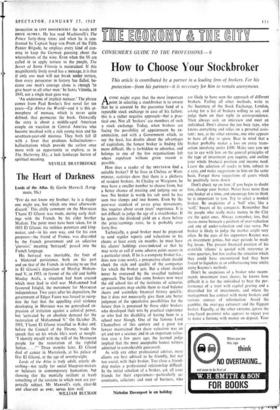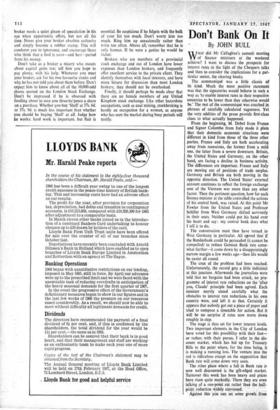How to Choose Your Stockbroker
rx- 'MIND -v-A 8 III grU CONSUMER'S GUIDE TO THE PROFESSIONS —6 This article is contributed by a partner in a leading firm of brokers. For his protection—from his partners—it is necessary for him to remain anonymous.
How does a reader of the SPECTATOR find a suitable broker? If he lives in Chelsea or West- minster, statistics show that there is a plethora of resident brokers. At Chailey or Wargrave, he may have a smaller number to choose from, but a better chance of meeting and judging one or two. No broker is worth his salt until he has seen two slumps and two booms. Even by the post-war standard of yo-yo price movements, this requires about seven years' experience. It is not difficult to judge the age of a stockbroker. If he quotes the dividend yield on a share before the price/earnings ratio, he is probably over forty-five.
Technically, a good broker must be prepared to send regular reports and valuations to his clients at least every six months; he must have his clients' holdings cross-indexed so that he may write or call if some adverse point occurs in a particular stock. If he is a company broker (i.e., does new issue work), a prospective client should check the style and quality of the companies for which the broker acts. But a client should never be overawed by the so-called technical approach. The fact that some brokers now wear the old school ties of the institutes of actuaries or accountants may enable them to read balance sheets and assimilate financial history quickly; but it does not necessarily give them any better judgment of the speculative possibilities for the future than is possessed by those older brokers who developed their wits by practical experience or who had the disability of having been to a school near Slough. One of the famous Lord Chancellors of this century and a great tax lawyer maintained that share valuation was an art and not a science; and in an important valua- tion case a few years ago, the learned judge implied that the most acceptable honest witness admitted to considerable guesswork.
As with any other professional adviser, most clients are best advised to be friendly, but not too social, with their broker. Too close a friend- ship makes a professional relationship difficult. In the initial selection of a broker, ask all your friends for their experiences—particularly ac- countants, solicitors and men of business, who
Nicholas Davenport is on holiday, are likely to have seen the approach of different brokers. Failing all other methods, write to the Secretary of the Stock Exchange, London, asking for a list of brokers willing to act, and judge them on their reply to correspondence. Then always seek an interview and meet an individual. Don't choose the too busy type, who knows everything and relics on a personal assis- tant: nor, at the other extreme, one who appears to have all day to spare. Bear in mind that a broker probably makes a loss on every trans- action involving under £400. Make sure you see eye to eye with him on the general principles of the type of investment you require, and outline your whole financial position and income need. Leave the selection of stocks to him, subject to a veto, and make suggestions to him on the same basis. Forget those suggestions of yours which he positively turns down.
Don't check up on him; if you begin to doubt him, change your broker. Never have more than one broker at a time, and encourage him to think he is important to you. Try to select a modest broker. Be suspicious of a 'bull' who, like a 'wolf,' boasts of his conquests. Remember that the people who really make money in the City are the quiet ones. Always remember, too, that shares move between a position of over-valuation and one of under-valuation and vice versa. No broker is likely to judge the market aright very often. In the eyes of his supporters Keynes was an investment genius, but our periods he made big losses. The present financial position of his erstwhile 'clients' is quoted with reverence in some quarters, but few realise the situation which they could have encountered had they been forced to liquidate at an embarrassing time whilst using Keynes's methods.
Don't be suspicious of a broker who recom- mends investment trust shares; he knows how difficult it is for the individual to beat the per- formance of a trust with capital gearing and a diversified list of investments, and where the management has contact with many brokers and various sources of information. Avoid the gambler, the over-gay extrovert and the flippant broker. Equally, at the other extreme, ignore the long-faced pessimist who appears to expect you to make a fortune with money on deposit. Your broker needs a quiet gleam of speculation in his eye when opportunity offers, but not all the time. Never give your broker absolute authority and simply become a rubber stamp. This will condemn you to ignorance, and encourage those who think that a fool is soon—and best—parted from his money.
Don't take as a broker a misery who moans about capital gains tax; tell him you hope to pay plenty, with his help. Whenever you meet your broker, ask for his two favourite stocks and why he has not told you about them before. Don't expect him to know about all of the 10,000-odd shares quoted on the London Stock Exchange. Don't be impressed if he is obsessed with footling about to save you three-ha'pence a share on a purchase. Whether you buy 'Shell' at 37s. 6d. or 37s. 9d. is much less important than whether you should be buying 'Shell' at all. Judge how he works; hard work is important, but flair is essential. Be suspicious if he fidgets with the bulk of your list too much. Don't worry him too much. Ring him up occasionally rather than write too often. Above all,' remember that he is only human. If he were a genius he would be richer.
Brokers who are members of a provincial stock exchange and out of London have lower expenses than London brokers, and frequently offer excellent service to the private client. They identify themselves with local interests, and have more leisure for discussion than most London brokers; they should not be overlooked.
Finally, it should perhaps be made clear that there are no female members of any United Kingdom stock exchange. Like other hazardous occupations, such as coal mining, stockbroking is hardly an occupation for a woman, as anyone who has seen the market during busy periods will testify.



































 Previous page
Previous page